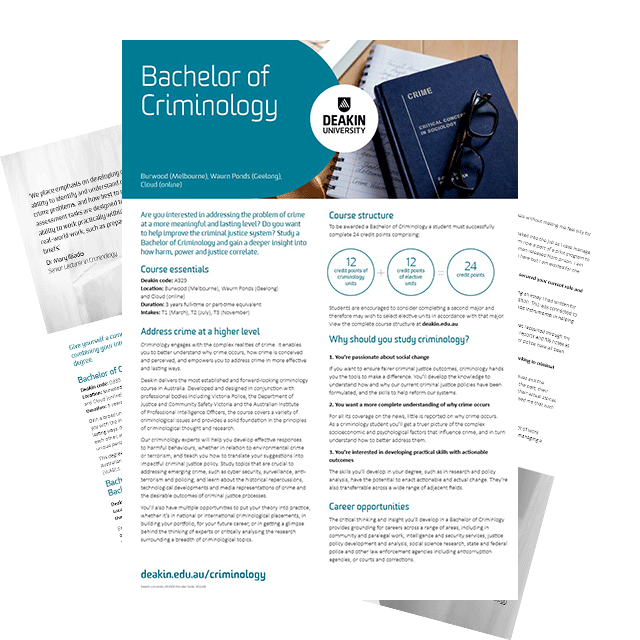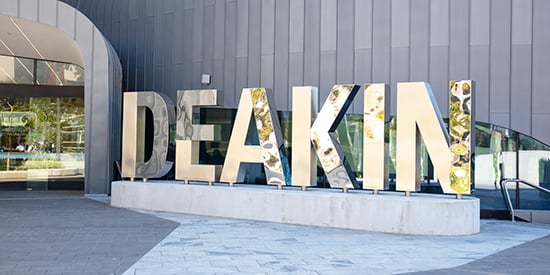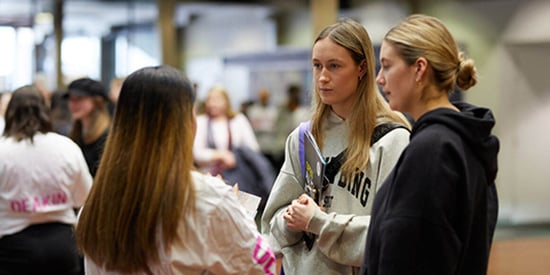Get hands-on in Deakin’s crime scene training facility
Professionally accredited forensic science component
Join the largest criminology student cohort in Victoria
Key facts
4 years full time or part-time equivalent
Key dates
Direct applications to Deakin for Trimester 2 2024 close 23 June 2024
Current Deakin Students
To access your official course details for the year you started your degree, please visit the handbook
Course overview
Explore the nature of crime and the science behind the collection, examination and presentation of evidence with this combined degree in criminology and forensic science. You’ll discover what’s behind criminal behaviour, learn valuable courtroom skills and get hands-on experience examining evidence in simulated crime scenes.
Criminology is the study of crime and the motivations behind criminal behaviour. Forensic science is an applied science concerned with the law and legal proceedings and can include specialist areas such as crime scene investigation, forensic medicine and lab sciences.
Led by a team of highly experienced criminology and forensic science experts, you’ll learn about the many interrelated concepts that underpin these professional areas where the law meets science.
The combined degree draws from both the arts and science disciplines. It’s designed to give you a broad appreciation of the professional, social, economic and cultural contexts of why crimes are committed and teach you how to examine evidence for the purposes of legal proceedings.
In the forensic science stream you can choose to focus your studies by completing a major sequences in either Forensic Biology or Forensic Chemistry. The course covers forensic chemistry and toxicology including trace chemical evidence, arson and explosives investigations, analysis of illicit drugs and forensic toxicology reporting. Our purpose-built crime scene facility lets you examine evidence and identify illegal products and endangered species. You’ll also learn how to apply forensic analysis including chemical, biological and physical techniques.
In the criminology stream you’ll take a close look at the nature of crime, investigating why crimes are committed. You’ll explore the various theoretical approaches that shape our understanding of crime in contemporary society and how communities respond to criminal behaviour. You’ll examine the criminal justice system from a sociological perspective, explore crime prevention and security, criminal and civil law and the laws of evidence.
This double degree prepares you for careers in criminology, forensic science and forensic criminology. You might choose to work in crime prevention, community development, security, policing, corrections, military services or criminal justice research. Other specialist areas you can explore include forensic sociology, criminal psychology and forensic investigation.
Units in the course may include assessment hurdle requirements.
Read MoreCourse information
- Award granted
- Bachelor of Forensic Science / Bachelor of Criminology
- Year
- 2017 course information
- VTAC code
- 1400315561 - Waurn Ponds (Geelong), Commonwealth Supported Place (HECS)
- Deakin code
- D329
- CRICOS code?
- 075455D Waurn Ponds (Geelong)
- Level
- Undergraduate
- Approval status
- This course is approved by the University under the Higher Education Standards Framework.
- Australian Qualifications Framework (AQF) recognition
The award conferred upon completion is recognised in the Australian Qualifications Framework at Level 7.
Course structure
To complete the Bachelor of Forensic Science/Bachelor of Criminology, students must attain 32 credit points. Most units (think of units as ‘subjects’) are equal to 1 credit point. So that means in order to gain 32 credit points, you’ll need to study 32 units (AKA ‘subjects’) over your entire degree. Most students choose to study 4 units per trimester, and usually undertake two trimesters each year.
Students will undertake 16 credit point in the Faculty of Science, Engineering and Built Environment and 16 credit points in the Faculty of Arts and Education course-grouped units. Course requirements for both the Bachelor of Forensic Science (S324) and Bachelor of Criminology (A329) must be satisfied.
Core
Bachelor of Forensic Science
Core Units
Students must complete a major sequence in either Forensic Biology or Forensic Chemistry on top of the core unit requirements.
# Must have successfully completed STP010 Introduction to Work Placements (0 credit point unit)
Bachelor of Criminology units
* ACR212, ACR213 Trimester 1 (alternate years 2014, 2016) and trimester 3 (alternate years 2015, 2017)
** ACR210, ACR211 Trimester 3 (alternate years 2014, 2016) and trimester 1 (alternate years 2015, 2017)
Electives
Select from a range of elective units offered across many courses. In some cases you may even be able to choose elective units from a completely different discipline area (subject to meeting unit requirements).
Major sequences
Bachelor of Forensic Science major sequences
Refer to the details of each major sequence for availability.
Intakes by location
The availability of a course varies across locations and intakes. This means that a course offered in Trimester 1 may not be offered in the same location for Trimester 2 or 3. Check each intake for up-to-date information on when and where you can commence your studies.
Trimester 1 - March
- Start date: March
- Available at:
- Waurn Ponds (Geelong)
Trimester 2 - July
- Start date: July
- Available at:
- Waurn Ponds (Geelong)
Deakin splits the academic year into three terms, known as trimesters. Most students usually undertake two trimesters each year (March-June, July-November).
Workload
You can expect to participate in a range of teaching activities each week. This could include classes, seminars, practicals and online interaction. You can refer to the individual unit details in the course structure for more information. You will also need to study and complete assessment tasks in your own time.
Need help?
Ask a question about studying at Deakin
Entry requirements
Recognition of prior learning
The Faculty may give credit towards a BSc for previous tertiary study and other approved forms of post-secondary study or experience. This previous study need not have led to a complete qualification; for example, a student may be given credit after completing the first year of a course at another institution. All applications for advanced standing must be made initially to the Selection/Enrolment Officer who will advise students of the necessary procedures.
All applications are considered on merit and usually no credit will be given for subjects/courses/units completed more than seven years prior to the request. For the BSc the maximum credit for prior learning that can be granted is 16 credit points. This may include up to 8 credits for non-science studies.
Fees and scholarships
Fee information
Learn more about fees.
The tuition fees you pay will depend on the units you choose to study as each unit has its own costs. The ‘Estimated tuition fee’ is provided as a guide only based on a typical enrolment of students undertaking the first year of this course. The cost will vary depending on the units you choose, your study load, the time it takes to complete your course and any approved Credit for Prior Learning you have.
Each unit you enrol in has a credit point value. The ‘Estimated tuition fee’ is calculated by adding together 8 credit points of a typical combination of units for that course. Eight credit points is used as it represents a typical full-time enrolment load for a year.
You can find the credit point value of each unit under the Unit Description by searching for the unit in the Handbook.
Learn more about fees and available payment options.
Scholarship options
A Deakin scholarship could help you pay for your course fees, living costs and study materials. If you've got something special to offer Deakin - or maybe you just need a bit of extra support - we've got a scholarship opportunity for you. Search or browse through our scholarships
Apply now
Applications for Trimester 1, 2025 open in August. Each year, thousands of students prepare for uni with the help of Deakin support services. We offer a huge range of support, including one-on-one consultations, webinars, online resources and events throughout the year.
Some of our courses have limited places available - for the latest on courses still open for application, visit Courses by trimester.
Create an account in the Deakin Application Portal, start your application, enter personal details, education experience, upload supporting documents and submit. Need help? Play this video, or contact one of our friendly future student advisers on 1800 693 888 or submit an online enquiry.
Entry pathways
View pathways into the Bachelor of Forensic Science/Bachelor of Criminology with our pathways finder.
Alternative exits
Contact information
Faculty of Science, Engineering and Built Environment
School of Life and Environmental Sciences
Tel 03 9244 6699
sebe@deakin.edu.au
www.deakin.edu.au/life-environmental-sciences
Faculty of Arts and Education
Tel 03 5227 1359
artsed@deakin.edu.au
Careers
Want a degree that’s more than just a qualification? Our industry connections, world-class facilities and practical approach to learning are just some of the reasons why Deakin students graduate confident and ready to thrive in the jobs of tomorrow.
Career outcomes
As a graduate of this course, you may find employment opportunities as a forensic scientist, criminologist or related role, in both the public and private sector, including areas such as the forensic science industry, science-based industries, teaching, government agencies, state and federal police, ASIO, correctional services, community services, and private security industries.
Professional recognition
Graduates of this course are eligible to apply for membership of the Australian and New Zealand Forensic Science Society (ANZFSS). The Bachelor of Forensic Science component of the combined course is also accredited with the Chartered Society of Forensic Sciences.
Course learning outcomes
Deakin's graduate learning outcomes describe the knowledge and capabilities graduates can demonstrate at the completion of their course. These outcomes mean that regardless of the Deakin course you undertake, you can rest assured your degree will teach you the skills and professional attributes that employers value. They'll set you up to learn and work effectively in the future.
Please refer to the Course Learning Outcomes (CLOs) of the single degree.
Events Explore more events
Footnotes
*Year on year, our undergraduate students are the most-satisfied students of all Victorian universities. Australian Graduate Survey 2010–2015, Graduate Outcomes Survey 2016–2019 (GOS), Quality Indicators for Learning and Teaching (QILT).





